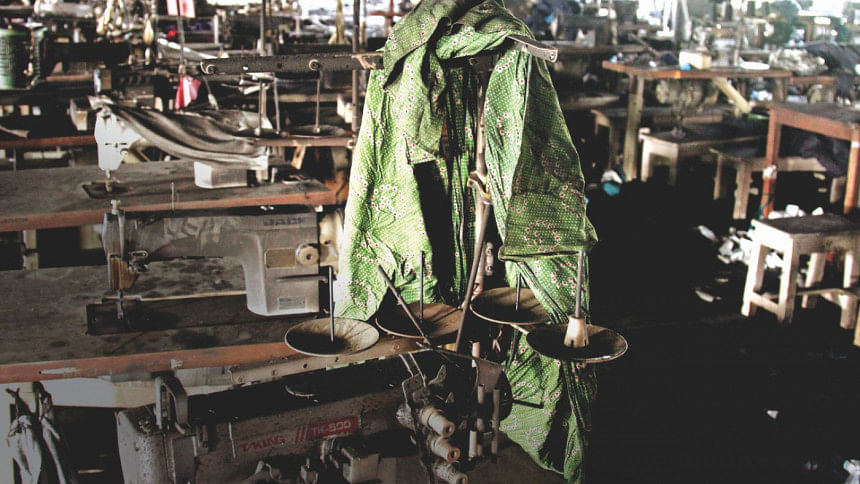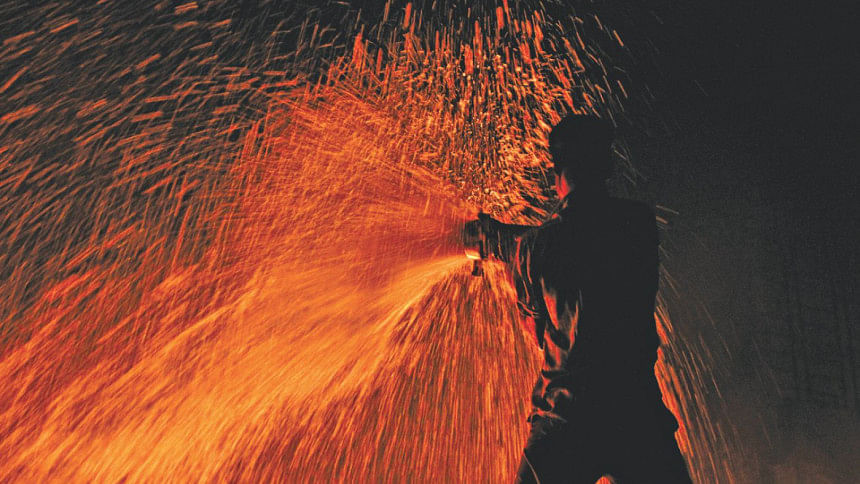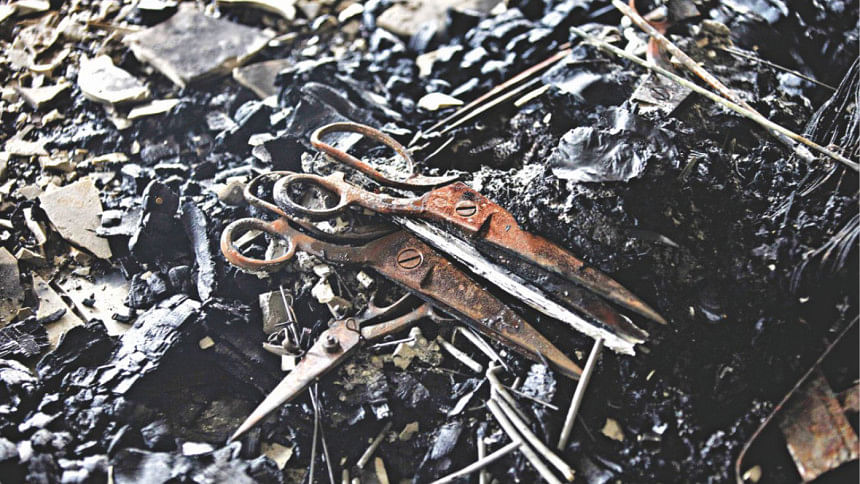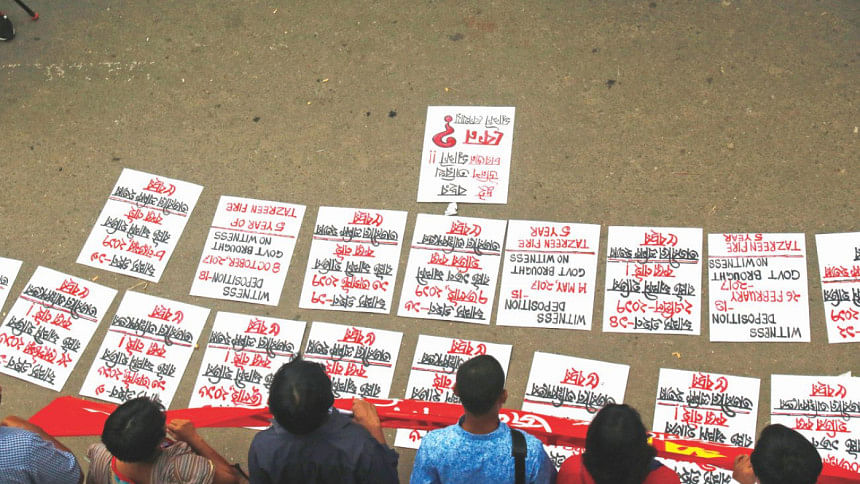5 years since Tazreen: delayed compensation and deferred justice

It has been five years since Reba leaped out of the third floor of the Tazreen garments factory and fractured both her legs. It's been half-a-decade since a rod pierced through Akash's eyebrow, after he smashed a window in an attempt to escape the burning floor. It has also been five years since either of them have had a good night's sleep.
Many survivors of the Tazreen garments tragedy of November 24, 2012, which killed 119 and injured more than 200 workers till date, continue to live in dire straits. Many of them are yet to recover from their physical injuries and as a result are struggling to find jobs. Survivors are also scared of returning to work in other factories as they continue to battle mental wounds.
"I think the trauma of Tazreen will haunt me till the day of Qayamat," says Reba. "When you recall those scenes in your head, it's not possible for you to stay humane. Sometimes I picture those scenes when I can't sleep at night… and the screams of bachao bachao, keeps ringing in my ears," she adds.
After jumping off the third floor, Reba hurt her spinal cord and her legs. There was a time when she could work from 9 am to 9 pm at night. Today though, she struggles to complete a six-hour work cycle.
"If I go to work for one day, I need to take the next day off. It's not something the owners of factories like. The supervisors mockingly ask me if this is a training center where I can take as many leaves as I want to," she says.
Reba attributes her condition today to the lack of proper treatment. She believes that had she received financial funding immediately after the factory burnout, she would have been in a much better position today.
Most of the survivors received money last year from the Tazreen Claims Administration (TCA), which was formed to compensate the victims of the Tazreen Fashion fire in September 2015.
The TCA grew out of an initial agreement signed by C&A, the C&A Foundation, IndustriALL Global Union and the Clean Clothes Campaign in November 2014. The TCA was responsible for raising money for the Tazreen victims. Brands and retailers with revenue more than $1 million had been asked to pay a minimum of $100,000 to the fund. Brac USA, C&A Foundation, Fung Foundation, Kik and El Corte Ingles donated to the TCA. Aside from the TCA, the government and the Bangladesh Garment Manufacturers and Export Association (BGMEA) also paid the victims.
On the whole, Reba claims to have received BDT 3.5 lakhs from different sources, of which, 2.5 lakh was provided by the TCA last year, four years after the incident.
"The money that I received from Gulshan (TCA) last year was spent on the loans that had accumulated over the four years. How can you expect me to spend on medication? I can't work either. I am trapped in a very cruel cycle," laments Reba.
Aakash, who has lost control over his left leg ever since the industrial disaster, narrates a similar tale.
"I personally feel that my family would have been happier had I passed away five years ago. Now they are forced to take care of me and I basically can't do anything for them," he says.
"Had I received money earlier, at least I wouldn't have become a disabled like I am today," he adds ruefully.

In order to keep his limbs alive, Akash is required to do therapy every week. There are times when he can't make it to the sessions because he is too tired after work. "The owner of the place where I live has offered me a job in his small factory. It's basically one room and I produce how much ever I can. Thankfully, he is very understanding," says Akash.
While he is working on ways to overcome his physical challenges, he still does not know how to deal with the random trauma attacks that he gets. "Whenever there's some kind of a noise, for instance if a tyre bursts, my head starts hurting. I feel terrified. I can't work for the next 30 minutes. I feel really tense," he explains.
The man who used to take care of his family single-handedly has to depend on his younger brother today. But he isn't sure how long this arrangement will work. "After I got money from the office in Gulshan (TCA) my brother reminded me that he has been looking after me for three years and that he does not know how much longer he can continue. I felt really bad. I told him that I will pay him once I clear all my other loans with the money I received," says Aakash.
Like Aakash, many workers claim that they could not do much with the financial assistance that they received last year since they were already drowning in debts. If anything at all, they were pressurised to return the money that they had borrowed from different sources.
Nasima, who still lives nearby the Tazreen arena, for instance was forced to take the money out of her Dutch Bangla Bank Account and give it to her landlord and the shopkeepers.
"I don't think I was even able to utilise 2.5 taka of the 2.5 lakh taka that I got. After people in the area came to know that I got the money, they took me to the bank and made me give them the money on that very day. I am still one lakh in debt and I can't start working before my health improves," says Nasima.
While Nasima is going through tough times, she is one of the luckier ones. Her former neighbour, Zerin, has had it worse. Despite spending all the money that she received from TCA last year to clear her debts, she still owed her homeowner BDT 30,000. As a result, Zerin, her mother and her sister's two children were forced to leave the house and go to Mymensingh.
"Two years after Tazreen, my sister died of cancer and now I am begging people to give my family a place to stay. Believe me when I say this, I am still not in a position to work. I can't even cook rice, forget going back to the factory. If I knew that I would have had to go through so much pain, I wouldn't have come out of the fire. I would have preferred to die," says Zerin, almost in tears.
Human rights activists and the injured workers refuse to use the word 'compensation' to describe the financial assistance that they received after the disaster. The amount of money that they have received is not enough to help them get out of the rut they are stuck in.
"This isn't compensation. You can call it donation, but not compensation," says Hameeda Hossain, a prominent human rights activist.

"According to the 2006 [Labour] law Tk 1 lakh should be given in compensation for accidental deaths and Tk 1.25 lakh for those disabled for life. But this is an old provision. Times have changed and many trade unions are asking for this to be modified," she adds.
According to Syed Sultan Uddin Ahmed, Assistant Executive Director of the Bangladesh Institute of Labour Studies, the victims of the Tazreen fire were not able to benefit from the financial assistance that they received because they got it four years late. He says that the absence of proper injury assessment centre in Bangladesh negatively affected those workers who were injured during the fire.
Furthermore he believes that the compensation should be dispatched in bonds and not via cash as that can provide more security for the workers and encourage them to spend on their primary needs, such as medication.
If the harrowing situation of a number of these workers isn't enough, the rate at which the case filed against the owners of the factory is progressing, isn't providing them with any hope of getting justice either.
In 2013, a probe body formed by the home ministry stated that there was 'unpardonable neglect' on the part of the owners Delwar Hossain and Mahmuda Akter. In addition it was later revealed that the owners of the factory had not renewed the factory's fire safety certification, which had expired five months before the day of the tragedy, either. The owners also did not have permission to build more than three floors in the factory, but they had, instead, constructed eight.

The most outrageous aspect of this fire was that the main doors of the factory were locked and the workers weren't able to immediately exit the factory after the fire broke out.
In 2015, a Dhaka court framed charges against the owners. While there have been 19 hearings since 2015, the prosecution team, representing the victims of the factory, managed to present witnesses in only four of them. Activists protested this delay in making any headway in a demonstration that took place in front of the National Press Club in Dhaka last Sunday.
Kazi Shahanara Yeasmin, the Additional Public Prosecutor who is representing the victims, says that it has been a difficult task for the prosecution team to find witnesses, for a number of reasons.
"There are a total of 104 witnesses named. But the problem is that we don't have their permanent addresses. After the Tazreen fire, many of them left the area and went to their respective permanent homes. But we don't know where those are," says Yeasmin.
Furthermore she says that they are looking for witnesses serially, which is another reason why the process is taking a lot of time. "For instance on the first day we look for witness number 1, 2 and 3. The next day we go to the next three or four witnesses. There is a cell in the police which gets the order from the court to bring the witnesses and then the police go looking for them," she explains.
Star Weekend independently contacted a number of witnesses of this case and received mixed responses. There are still a number of witnesses who continue to live nearby the Tazreen arena. Some of them, especially those who have been severely injured after the attack, are adamant about going to court. They want to go out there and speak about the injustices against them. All they are waiting for is a call from the court.
And then there is a group of witnesses who are afraid to get involved. Some of them said that they have suffered enough and that now it was time to move on. A couple of them are afraid of going to court as they believe that their life could be in danger because of their statement.
Regardless of the situation, activists say that nothing can justify the lack of progress in the case. "The workers might be scared to go to the court and speak against their former employee. Considering the circumstances of the country, that is understandable. But the prosecution team can't simply wait. They have to create an environment to bring witnesses," Saydia Gulrukh, who is a member of the group Activist Anthropologist.
"Even if witnesses don't want to come, the case is very strong because there's plenty of evidence against the owners. There's a report from the Home Ministry which blamed the owners and they also did not renew their fire safety certificate. A case cannot be stalled for two years just because there are not witnesses," she adds.
Industrial deaths have witnessed a disheartening precedent for justice in Bangladesh and activists like Saydia are afraid that if this case is not given due importance then it might suffer a similar fate as that of the previous cases related to industrial disasters.

 For all latest news, follow The Daily Star's Google News channel.
For all latest news, follow The Daily Star's Google News channel. 



Comments